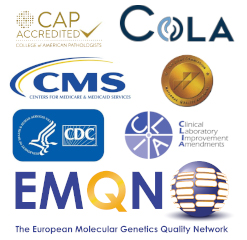Breast Cancer
WHY WE’RE DIFFERENT
EXCLUSIVE PARTNERS
- Perkin Elmer
- Sngene Lab
- Genique lifesciences

Breast Cancer
Breast cancer is the most commonly diagnosed form of cancer in women. [1] Approximately 1 in 8 women will be diagnosed with breast cancer by the age of 85.
While ‘breast cancer’ refers to all cancers originating in the breast tissue, not all breast cancers are the same. They are driven by different genetic mutations and knowing the underlying mutations of your breast cancer may reveal potential drug targets and alternative therapies. It is the key to developing personalized treatments for cancer patients.
Types of Breast Cancer
Breast cancers are usually driven by one of the following mechanisms:
- Estrogen Receptors (ER+): These breast cancers use the hormone estrogen to grow.
- Progesterone Receptors (PR+): These breast cancers use the hormone progesterone to grow.
- HER2 Amplification (HER2+): These cancers have too many copies of the HER2 gene which promotes cell growth.
Breast cancers can also be grouped based on their genetic makeup.
- Luminal A: ER+/PR+/HER2-
- Luminal B: ER+/PR+/HER2+
- HER2+: ER-/PR-/HER2+
- Basal-Like (Triple Negative): ER-/PR-/HER2-
Breast cancer can occur in different regions of the breast. The type of cancer is usually defined by the location in which the tumour first started growing.
- Ductal Carcinoma: The cancer started in the lining of the milk duct in the breast. This is the most common type.
- Lobular Carcinoma: The cancer started in the breast lobules, where milk is produced.
- Sarcomas: The cancer started in the connective tissues such as muscle, fat and blood vessels in the breast. This type is rare, occurring in <5% of breast cancers.
How can genomic testing benefit me?
Cancer is a complex disease, caused by a wide range of genetic mutations that can be present in many combinations. Each tumour has a unique genetic makeup, even amongst cancers of the same tissue type, such as breast cancer. Genomic testing can be used to analyze the DNA of your tumor and may identify the genetic mutations that are unique to your cancer.
Identifying the mutations in a patient’s cancer is the key to developing personalized treatments. Depending on the type of testing done, a comprehensive genomic analysis may provide information on potential therapeutics, development of resistance to treatments, prognosis, disease tracking, and may provide access to clinical trials and new treatments.
Clinical trials have shown that personalized therapies, developed from genetic testing of tumors, are the most effective way to improve treatment outcomes. Patients undertaking therapy as a result from genetic testing are shown to have longer progression-free, higher response rates to treatment and overall greater survival rates. Investing in genomic testing to obtain a complete and accurate diagnosis, is a small cost compared to the time and money that may be wasted on generic or ill-chosen therapies. Genomic testing provides a powerful diagnostic tool, and every patient deserves an accurate diagnosis.
The power of Genomic Testing in Breast Cancer
Breast cancer genome sequencing may identify:
- HER2mutations in cancers that are HER2 amplification negative by other common techniques (immunohistochemistry or in-situ hybridization), revealing a possible drug target
- BRCA+ mutations, which can be targeted with PARP inhibitors (PARPi). PARPi selectively target BRCA-deficient cancer cells and have shown benefit in triple negative breast cancer, BRCA-mutated ovarian carcinoma. [3,4]
- Resistance mutations in ER+ breast tumours, ~25% of which develop resistance to previously effective therapies and consequently undergo relapse, providing options for further treatment.
- FGFR1gene amplification associated with a lack of efficacy of CDK4 and CDK6 inhibitors, guiding treatment to more effective options
- Many other mutations in 500 genes* that will help guide your treatment by highlighting potential drug targets or drug resistance and prognosis, as a small percentage of tumours will have rare mutations that may be targetable with specific treatment options.
Potential therapeutics and resistance
Genetic mutations are identified in 95% of breast cancers. Amongst these mutations the most frequently mutated genes are TP53, PIK3CA, MYC, CCND1, PTEN, ERBB2, RB1 and the FGFR1 locus[2], all of which are covered on our Comprehensive Plus Tumour Analysis. If these mutations are identified in your tumour, it may highlight a number of potential targeted therapy options, such as:
Gene identified in Genomic Testing | Possible Treatments |
BRCA1 / BRCA2 | PARP Inhibitors (e.g Olaparib – Lynparza®) |
FGFR1 | FGFR Inhibitors (e.g Erdafitinib) |
PIK3CA | PI3K/mTOR Inhibitors (e.g Alpelisib) |
CCND1 | CDK4/6 Inhibitors (e.g Palbociclib – Ibrance®) |
What testing options are available?
Codex Pro Plus Solid Tumour Analysis
- The Codex pro PlusSolid Tumour Analysis may detect DNA mutations and RNA fusions across 121 key genes that are commonly indicated in a range of cancer types.
- The most frequently mutated genes found in breast cancers are ESR1, TP53, PIK3CA, MYC, CCND1, PTEN, ERBB2, RB1, RAS, BRCA1, BRCA2 and the FGFR1 locus, all of which are covered on this test, as well as the BRCA1 and BRCA2 genes
- Your personalized report will provide you with the genetic characteristics of your tumour, which may provide information on potential therapeutics, resistance to therapeutics, prognosis and clinical trialsor new treatments you may be able to access.
Clinical trials:
https://ascopost.com/issues/march-10-2022-supplement-conference-highlights-sabcs-2021/pada-1-trial-with-early-identification-of-esr1-mutation-switch-to-fulvestrant-in-metastatic-breast cancer/?segCode=sabcs&utm_source=TAP%2DeTOC%2DSABCS%2DHighlights 2D022822%2DINTL&utm_medium=email&utm_term=68d13f7a231464bc5d809629 34516fe
https://ascopost.com/news/january-2021/palbociclib-plus-endocrine-therapy-vs-capecitabine-for-patients-with-hr-positive-her2-negative-breast-cancer/?fbclid=IwAR0BgVKwhDZbvkFzfSEpjP7gZxTqozVGDIhBAEi-E6DWpU769tuqTtRti9A
- BRCAmutations increase the risk of developing breast and ovarian cancer. Our BRCA Plus panel covers both the BRCA1 & BRCA2 tumour suppressor genes, as well as 10 other genes commonly involved in breast and ovarian cancers – ATM, CDH1, CHEK2, NBN, PALB2, RAD51C, RAD51D, RAD51IL3-RFFL, SMARC4 and TP53
- For patients currently diagnosed with breast cancer, BRCAPlus Somatic testing can be performed on a tumour sample and may detect mutations in the BRCA genes. If mutations are detected, this may offer information on alternative drug therapies and clinical trials.
- BRCAmutations are often germline, meaning they are in all cells in your body and may be passed down to your children. If there is a family history of ovarian cancer, or BRCA mutations, this can increase your risk of developing ovarian and breast cancer.
- BRCAPlus Germline testing can be performed on a blood sample which may indicate if there is a germline mutation in the BRCA This test also includes MLPA analysis. If the mutation is germline, family members can be tested to see if they have also inherited the mutation, allowing earlier detection and prevention.
Cell-Free Tumour DNA (ctDNA) Testing and Tracking
- Tumours may release small fragments of DNA (ctDNA) into the bloodstream, which may contain identical mutations to those identified in the primary tumour.
- As ctDNA is released into the bloodstream, this allows for a liquid biopsy to be performed from a blood draw. This may eliminate the need for invasive procedures to obtain samples, such as biopsies, which can be painful for patients or may not be possible due to the size or location of the tumour.
- ctDNA can be tracked over time to monitor your response to treatment and the development of resistance to treatment. ctDNA testing can also be used to check for residual cancer following treatment and can reflect tumour size and burden more accurately than other diagnostic techniques.
Ready to take control of your treatment plan?
Codex genetics center aims to educate patients and their families on their cancer types and empower them with the knowledge to take control of their treatment plans. As each patient’s case is unique, there is no “one size fits all” when it comes to testing. We encourage you to contact Codex Genetics center, and we can work with you and your oncologist/specialist, to determine what
References
- Cancer Australia. (2019). Breast cancer statistics. Retrieved from https://breast-cancer.canceraustralia.gov.au/statistics
- Nik-Zainal, S., H. Davies, J. Staaf, M. Ramakrishna, D. Glodzik, X. Zou, I. Martincorena, L. B. Alexandrov, S. Martin, D. C. Wedge, P. Van Loo, Y. S. Ju, M. Smid, A. B. Brinkman, S. Morganella, M. R. Aure, O. C. Lingjaerde, A. Langerod, M. Ringner, S. M. Ahn, S. Boyault, J. E. Brock, A. Broeks, A. Butler, C. Desmedt, L. Dirix, S. Dronov, A. Fatima, J. A. Foekens, M. Gerstung, G. K. Hooijer, S. J. Jang, D. R. Jones, H. Y. Kim, T. A. King, S. Krishnamurthy, H. J. Lee, J. Y. Lee, Y. Li, S. McLaren, A. Menzies, V. Mustonen, S. O’Meara, I. Pauporte, X. Pivot, C. A. Purdie, K. Raine, K. Ramakrishnan, F. G. Rodriguez-Gonzalez, G. Romieu, A. M. Sieuwerts, P. T. Simpson, R. Shepherd, L. Stebbings, O. A. Stefansson, J. Teague, S. Tommasi, I. Treilleux, G. G. Van den Eynden, P. Vermeulen, A. Vincent-Salomon, L. Yates, C. Caldas, L. V. Veer, A. Tutt, S. Knappskog, B. K. Tan, J. Jonkers, A. Borg, N. T. Ueno, C. Sotiriou, A. Viari, P. A. Futreal, P. J. Campbell, P. N. Span, S. Van Laere, S. R. Lakhani, J. E. Eyfjord, A. M. Thompson, E. Birney, H. G. Stunnenberg, M. J. van de Vijver, J. W. Martens, A. L. Borresen-Dale, A. L. Richardson, G. Kong, G. Thomas and M. R. Stratton (2016). “Landscape of somatic mutations in 560 breast cancer whole-genome sequences.” Nature.
- Lee, J. M., J. A. Ledermann and E. C. Kohn (2014). “PARP Inhibitors for BRCA1/2 mutation-associated and BRCA-like malignancies.” Ann Oncol 25(1): 32-40.
- Benafif, S. and M. Hall (2015). “An update on PARP inhibitors for the treatment of cancer.” Onco Targets Ther 8: 519-528.
- Straub, J. M., J. New, C. D. Hamilton, C. Lominska, Y. Shnayder and S. M. Thomas (2015). “Radiation-induced fibrosis: mechanisms and implications for therapy.” J Cancer Res Clin Oncol141(11): 1985-1994.
- Grossberg, A. J., X. Lei, T. Xu, S. F. Shaitelman, K. E. Hoffman, E. S. Bloom, M. C. Stauder, W. Tereffe, P. J. Schlembach, W. A. Woodward, T. A. Buchholz and B. D. Smith (2018). “Association of Transforming Growth Factor beta Polymorphism C-509T With Radiation-Induced Fibrosis Among Patients With Early-Stage Breast Cancer: A Secondary Analysis of a Randomized Clinical Trial.” JAMA Oncol.
